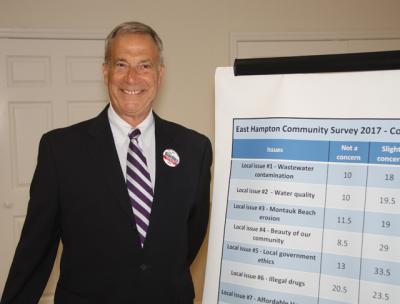Clean Water, Erosion Top Concerns in Republican's Survey

Wastewater contamination, water quality, and Montauk beach erosion were the most serious concerns of 200 residents who responded to a telephone survey initiated by a Republican candidate for the East Hampton Town Board, while noise from East Hampton Airport was the least important.
On Monday, Paul Giardina, who is also on the Conservative and Reform Party tickets in November, discussed the results of the survey, which was conducted between Aug. 22 and 30 at the American Legion Hall in Amagansett.
Mr. Giardina, who until his retirement was a longtime federal official at the Environmental Protection Agency, spoke about several of 13 issues that were ranked in order of importance, as determined by the survey.
Replacing the aging and inefficient septic systems from which nitrogen and phosphorous are leaching into groundwater and waterways will cost between $100 million and $200 million, Mr. Giardina said. But, he said, appropriating up to 20 percent of community preservation fund money for water quality projects, which voters approved last year, was inadequate since it would provide just $5 million a year.
“My running mates and I have worked with our federal and state colleagues to design a plan that will provide enough funding to solve our septic problems” without tapping the community preservation fund, he said, reading from his prepared analysis of the survey.
According to Mr. Giardina the town could obtain money from the Clean Water State Revolving Fund, a federal-state partnership that provides municipalities with low-interest financing for water quality infrastructure. “No East End town has ever made an application” for money from that fund, he said.
With regard to airport noise, Mr. Giardina reported that 26.5 percent of residents surveyed think it is a serious concern, with the same number calling it a slight concern. Rather, he said, the airport is most often called an important asset in listening sessions with voters, particularly so in the event of medical emergencies or disasters.
“I think some of the noise problems that people incur around the airport are really bad,” he told a questioner, but he said the Part 161 procedure, under which municipalities apply to the Federal Aviation Administration for permission to implement restrictions to reduce noise, was the appropriate mechanism to resolve the issue.
“There is a path forward, albeit it’s going to be slow,” he said of the process, which is expected to take two to three years. Instead, he said, the town had spent more than $2.5 million on unsuccessful litigation. He also suggested that money may eventually have to be repaid not from airport user fees but from the town budget.
“East Hampton is filled with a lot of special interest groups. I want to listen to everybody, but in the end somebody’s got to call the shot, and 26 percent isn’t where I’m going to put my money and time in this campaign.”
Government ethics placed fifth in importance in the survey, and Mr. Giardina used its prominence to attack local Democrats, including Julia Prince, a former town councilwoman, for serving as the Montauk manager and fisheries representative of Deepwater Wind, the Rhode Island company that intends to construct a 15-turbine wind farm approximately 30 miles off Montauk, which commercial fishermen oppose. (The wind farm’s impact itself placed ninth among the 13 issues cited.)
Ms. Prince is among the Democrats who, he said, are “eager to sell off Montauk’s maritime heritage and the serene surroundings of Gardiner’s Bay.” Instead, he said, the town could meet its energy needs through solar power “rather than tear up our ocean to generate electricity.”
Affordable housing ranked seventh among the issues. However, Mr. Giardina said that personally he thinks it is a serious concern and has proposed a public-private partnership “that will bring together bankers and builders, designers and real estate agents, to come up with creative solutions that will allow our residents’ children and elders” to live here. He also suggested that those solutions might warrant zoning changes to allow increased population density and multifamily development.
“What’s really missing” from town government, Mr. Giardina said, “is leadership — a willingness to take a clear stand and use your powers of persuasion to bring the community around to your point of view.” He pledged that, if elected, he would provide it. “We need leadership, not bullying,” he said.
